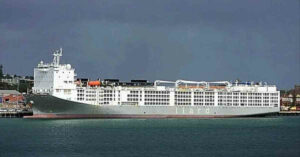
US-China Container Leasing Costs Triple Amidst Red Sea Crisis
February 19, 2024
Royal Caribbean’s “Icon Of The Seas” To Combat Food Waste Using AI Technology
February 20, 2024
Cape Town residents were left distressed on Monday when a terrible smell erupted from a ship in the harbour. The Al Kuwaita, a Kuwaiti-flagged livestock vessel, was transporting 19,000 live cattle from Brazil to Iraq. The unpleasant odour led authorities to inquire about the cause, which was quickly traced back to the livestock ship.
Zahid Badroodien, the mayor’s water and sanitation chief, verified on social media platform X that the ship was responsible for the “sewage smell blanketing parts of the city.” The ship’s imminent departure relieved people with an unpleasant beginning to the week.
Aside from the pungent odour, there were concerns regarding the treatment of the animals on board. The National Council of the Society for the Prevention of Cruelty to Animals (SPCA) sent a veterinary consultant to inspect the cattle. Their findings shed light on the animals’ horrific conditions, which included the accumulation of faeces and ammonia.

The stink onboard is beyond imagination, yet the animals face this daily, said the SPCA in a statement condemning the export of live animals by sea. The Al Kuwait had stopped in Cape Town to load cattle feed, adding to the demand against live animal export.
South Africa’s Democratic Alliance political party joined the crowd of outrage, stressing the terrible conditions animals undergo on such journeys. They claimed that live export exposes animals to various hazards, including excessive heat stress, injury, and even death.
This incident follows similar issues, such as a recent one in which a ship transporting thousands of livestock encountered difficulties at sea after being attacked by Houthi militants. While vets discovered no severe health issues among the livestock on that specific trip, worries remain about the physical condition of animals transported under such conditions.
Both campaigners and locals are questioning the ethics and morality of live animal exports as Cape Town struggles to recover from this terrible incident. Carli Costa, an animal rights activist, spoke out alongside other demonstrators on the Taliep Petersen Bridge, criticising the “unnecessary cruelty” done to the animals.
The NSPCA, known for its strong opposition to live animal exports, restated its argument, highlighting animals’ pain and suffering on such excursions. The ethical implications of such operations continue to stir controversy and require immediate action, with requests for stricter restrictions and a rising global movement against live animal exports.
While the ship prepares for its destination in Iraq, the lingering odour is a powerful reminder of the complicated ethical difficulties associated with global trading patterns and animal welfare. As the city deals with the aftermath, questions remain regarding the broader consequences of such instances for animal welfare and international trade policy.
Reference: BBC, The Hindu
Livestock Ship Carrying 19,000 Cattle Causes Foul Smell In Cape Town appeared first on Marine Insight – The Maritime Industry Guide
Source: Maritime Shipping News


